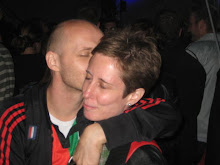The heart of riesling country
 Our second camping trip in two weeks, and back we were in Germany!
Our second camping trip in two weeks, and back we were in Germany! This time with John & Mariska and doggy companions Dries & Moon :-) to camping Wolf on the banks of the River Mosel, in the heart of German wine country. And our campsite was literally in the heart of the vineyards!
Our arrival on Thursday evening was nothing less then dramatic. As soon as we stopped the car next to a German couple enjoying a glass of wine outside their caravan, a massive cloud of white steam exploded out from under the bonnet!! Seems some sort of radiator hose had sheered clean off and the engine had been heating up nicely on the way. Lucky for us the worst happened immediately on arrival; the car was picked up the following morning; and by lunchtime saturday all was fixed again :-) The astute comment from our German neighbour : "it is definitely NOT a German car"!!!
In the meantime we had spent a relaxed day wandering the cobblestoned streets of Bernkastel-Kues, a nationally renowned health retreat and birthplace of Nicolaus Cusanus, widely considered one of the great geniuses of the 15th century! He is recognised today for his significant spiritual, political, and philosophical contributions to European history, as well as his participation in the power struggles between Rome and the German states of the Holy Roman Empire. Never heard of him, and for me, Bernkastel goes down as the place where I was finally won over to the delicacy of white asparagus with hollandaise sauce!
Also in the local area are Traben-Trarbach and the oldest city in Germany, Trier. Highlights of Traben-Trarbach are one of the most beautifully detailed city gates I have ever seen, and the fabulous Art Nouveau hotel, The Bellevue.
At the turn of the century (the previous one that is!), Traben-Trarbach was the second largest wine trading city in Europe after Bordeaux. The enormous prosperity and wealth generated by the wine trade formed the basis for widespread building construction in the popular style of the time, and Traben-Trarbach became renowned as Belle Epoque on the Mosel. The Bellevue, built in 1903 and originally known as the Clauss-Feist Hotel, became THE place to be and was frequented by contemporary "stars" including Baron von Richthofen, the Red Baron!
Trier, the oldest city in Germany, dates back to around 16 BC and was the capital city of the Roman province Galli Belgica. It quickly rose in importance and shortly before 100 AD an amphitheatere was built in Trier, a sure sign of a city of importance. Also a famous remnant of the Roman era is the Porta Nigra (the Black Gate), the largest remaining Roman city gate north of the alps, and now a designated World Heritage site.
The entire wine industry of the Mosel is also believed to be a legacy of the Romans, who planted the vineyards along the river in order to have a local source of wine for their garrisons. The steep riverbank slopes along the Mosel are considered some of the most labor intensive vineyards in the world. Mechanical harvesting is totally impractical, and nearly seven times more man hours are needed in the Mosel than in more conventional, flatter wine growing regions. Apparently if all the costs of manual harvest and all those man hours were calculated into the price of Mosel wine it would be one of the most expensive wines in the world! Lucky for us that isn't the case and we were able to sample reasonably priced local wines from the supermarket :-)
Next week off to the Czech Republic via Dresden - stay tuned !
Alli xxx


























































